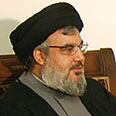
Hezbollah Chief Sheikh Hassan Nasrallah
צילום: AP
Hezbollah is in trouble
Op-ed: With Iran and Assad sinking, Lebanese terror group faces existential concerns
With Iran plummeting and Assad sinking, Hezbollah is also going down. The days of its intoxication with power are gone. The Shiite axis is fighting for its life and Hezbollah has become the most hated organization in the Arab world. Those betting on the Syrian president, who butchers with no mercy, are crushing along with him.
One need not get excited about the speeches delivered by Secretary General Hassan Nasrallah; these are almost comic speeches, portraying the organization as stable and aggressive. Yet does he really think that Israel's public opinion buys into his statements as it did in the past?
The economic oxygen supply that arrived from Iran and kept Hezbollah alive is drying up. Iran faces the economic threat of paralyzing sanctions, its regime is on the defensive, and it has no money for adventures on the Lebanese front. This means that Hezbollah has no money to pay salaries and fund projects.
The group's stock is plummeting in Lebanon's Shiite community as well. The country's Shiite citizens are disturbed by the one-sided support Nasrallah grants Assad, knowing that the score with them may be settled later on. And what will happen to Hezbollah and to them should Iran's regime collapse?
Hezbollah faces existential concerns over the fall of its allies, as well as the Hariri murder trial, while sustaining harsh criticism in Lebanon's public opinion and political establishment. This is why Nasrallah declares that he is not obligated to follow Iran's directives. He seeks to display authenticity. "Iran doesn't command us," he said. "Even if a strike hits Tehran's nuclear sites, Iran will not ask us to do anything and it does not expect a thing. When the time comes, we shall decide on our own which steps to take."
2-headed creature
There's truth to these words. Hezbollah has always been a two-headed creature – an Iranian head and a domestic Lebanese head. In some cases, one head's interests clashed with the other. For example, in 2006, when Nasrallah dared to embark on a war with Israel without seeking Iran's permission. The Iranian's have not forgotten this.
As more people in Lebanon smell Hezbollah's weakness, more voices are calling for the organization to disarm. Hezbollah is the only militia permitted to operate in Lebanon, and the group tries to portray itself as a patriotic organization protecting Lebanon from Israel, rather than as an Iranian puppet.
However, this argument is also baseless, as there is no confrontation between Lebanon and Israel, and hence there is no need for an actual army, armed with tens of thousands of missiles, to seemingly defend Lebanon. The group that portrays itself as Lebanon's defender is in fact the main threat jeopardizing the country. Hezbollah itself is the cause of the conflict.
And what about striking Israel at this time? Hezbollah can do it, but realizes it would be suicide. Such move would not bring any benefits to itself, to Assad, or to Iran. The attention of the Syrian rebels or the world's attention to Iran would not be diverted as result of such Hezbollah strike. The opposite is true: The pressure on Syria and Iran will merely intensify.
Moreover, Israel is not expected to settle for merely weakening Hezbollah this time around, as was the case in 2006. This time, Israel may seek the group's destruction should Hezbollah attack.
And still, Nasrallah's and his army's control in southern Lebanon is convenient for Israel. The Shiite Hezbollah maintains the area's stability, prevents Sunni groups such as al-Qaeda and Global Jihad from operating there, and also prevents Palestinian terror groups from reaching the border with Israel.
Israel has no interest in intervening in any way whatsoever, neither in Lebanon nor in Syria. Hezbollah's trouble vis-à-vis the Middle East's Sunnis and vis-à-vis Syria are its own business, and this is how it should be.










